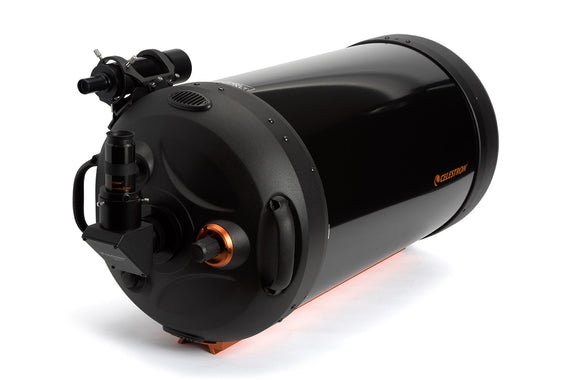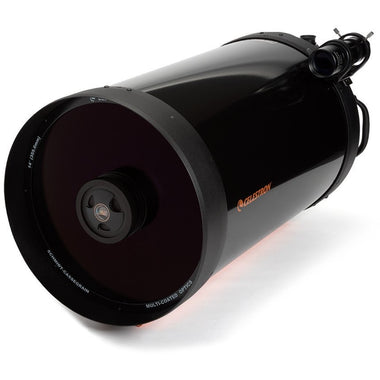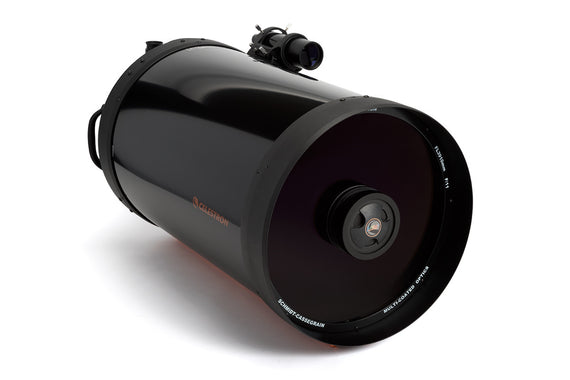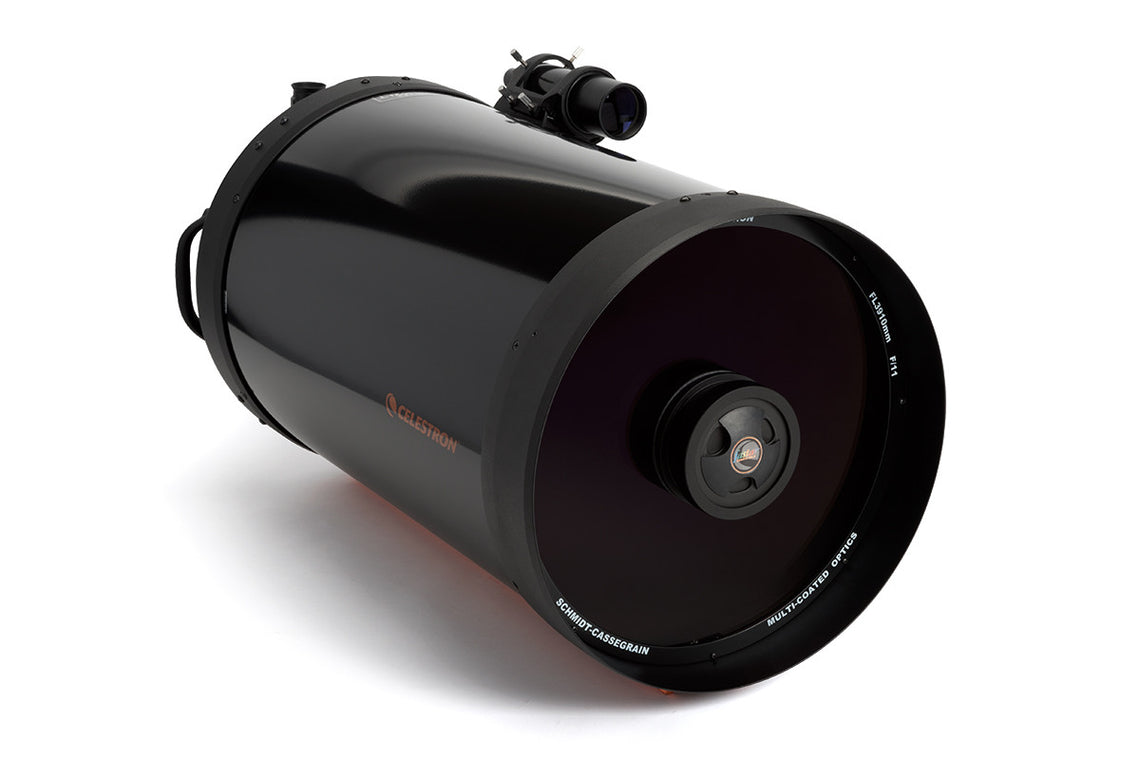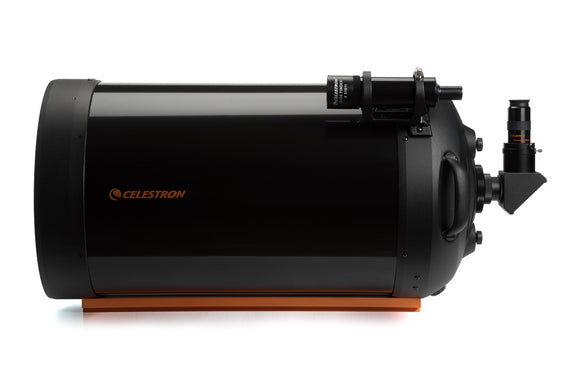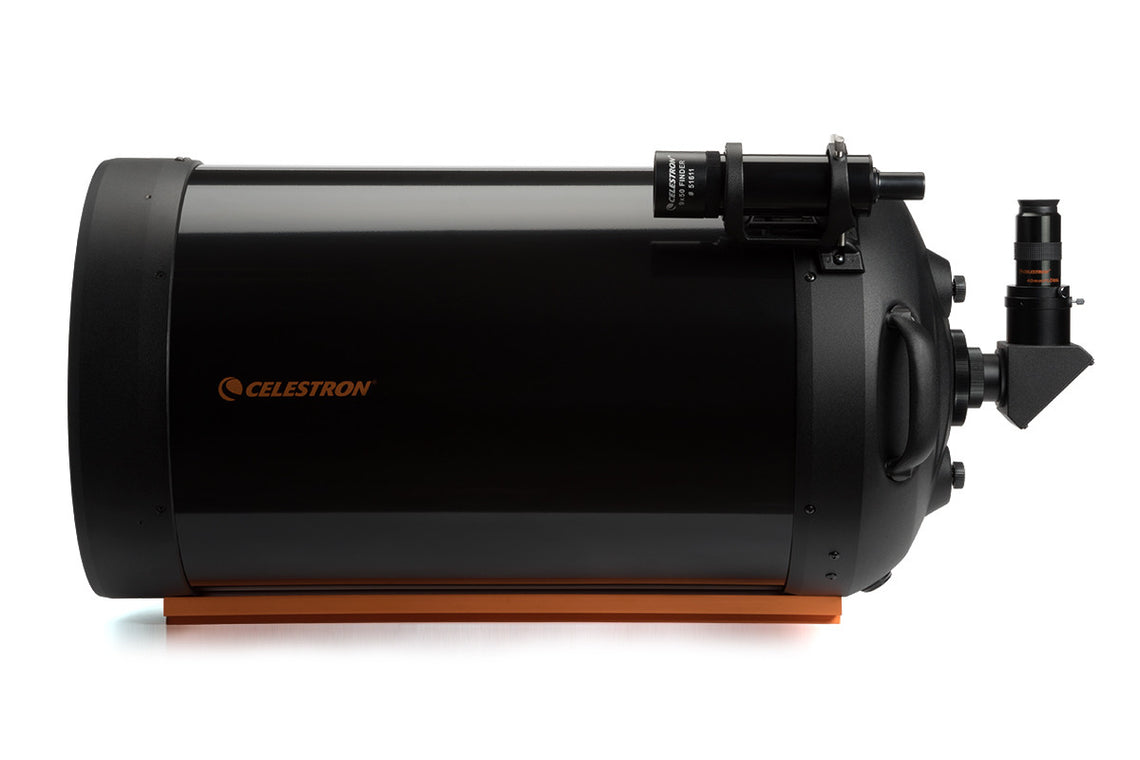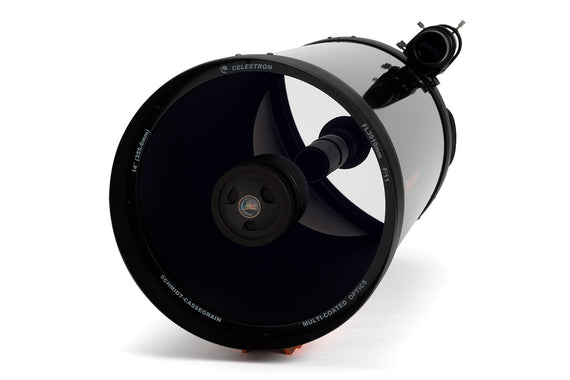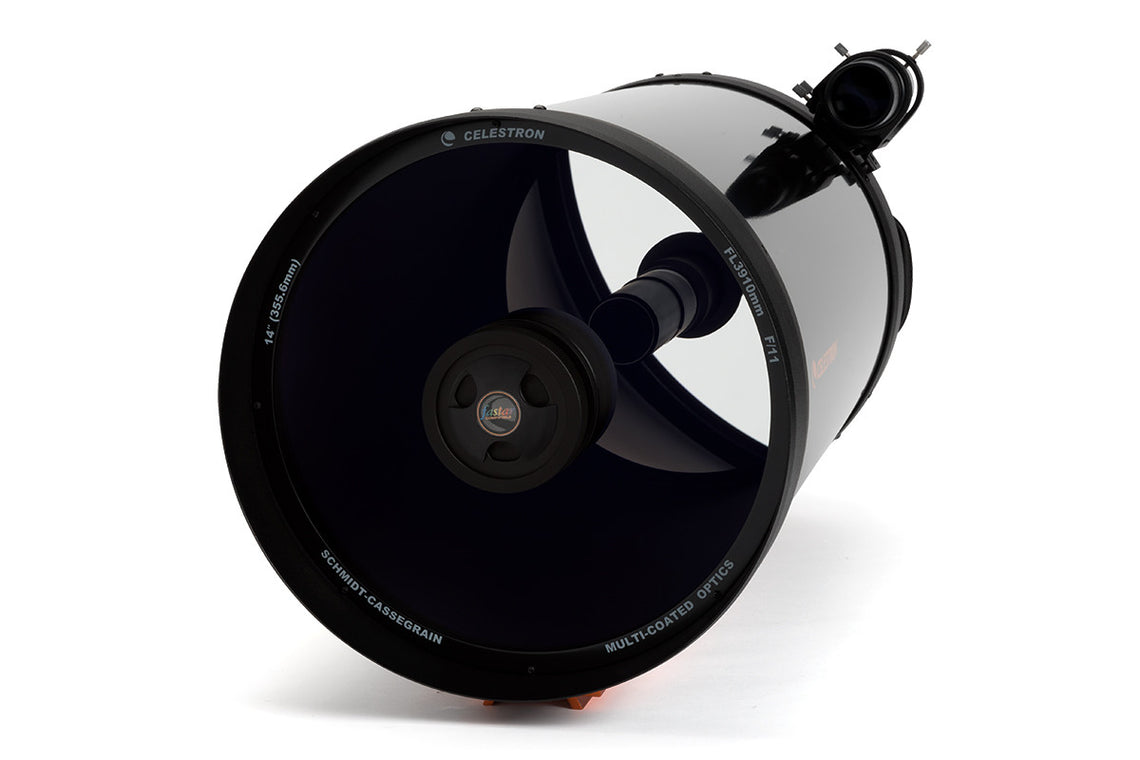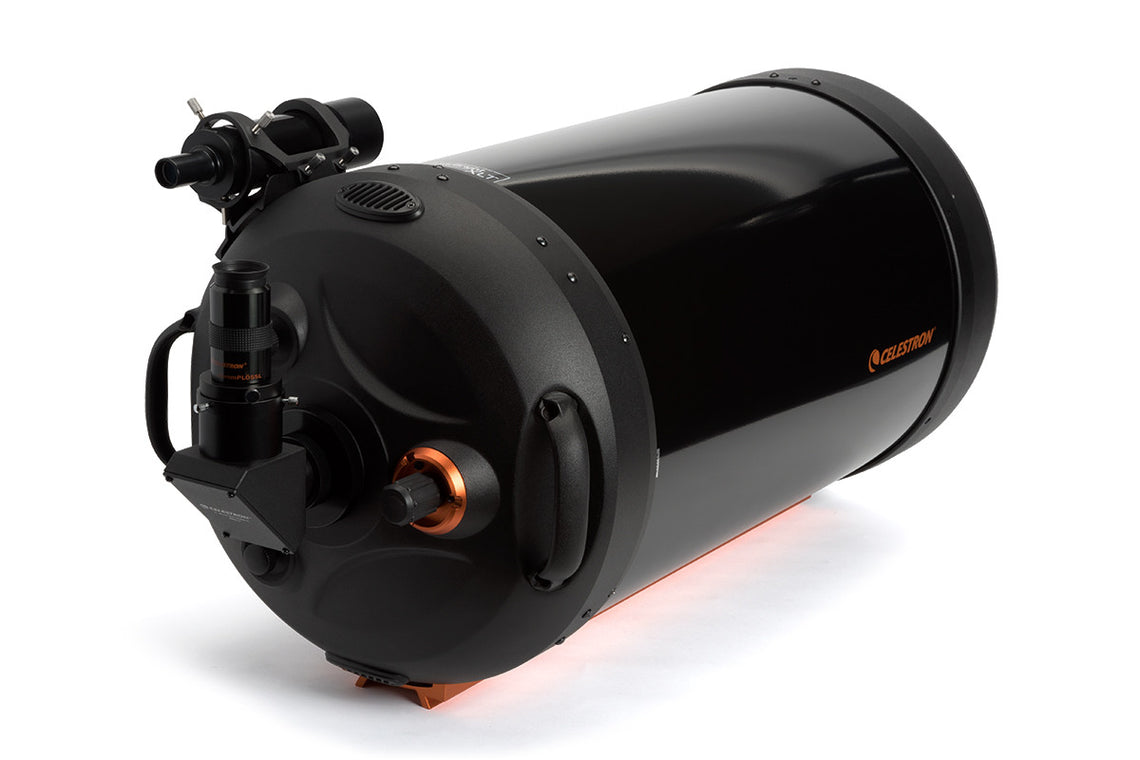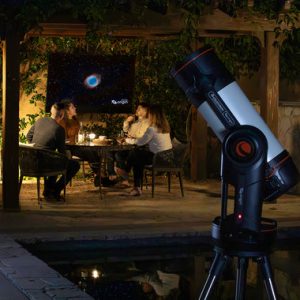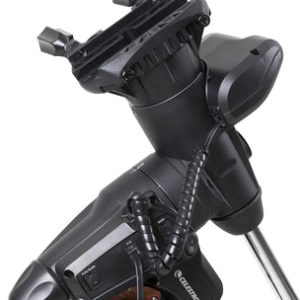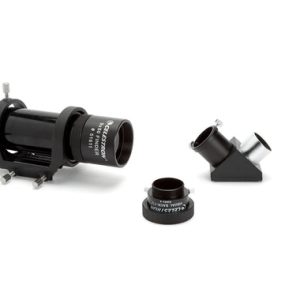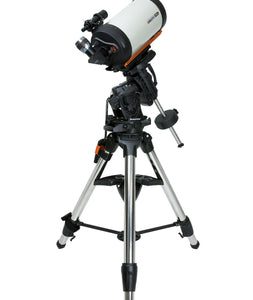Description
| General | |
|---|---|
| Optical Design: | Schmidt-Cassegrain |
| Aperture: | 355.5mm (14″) |
| Focal Length: | 3910mm (154″) |
| Focal Ratio: | f/11 |
| Focal Length of Eyepiece 1: | 40mm (1.57″) |
| Magnification of Eyepiece 1: | 98x |
| Finderscope: | 9×50 |
| Star Diagonal: | 2″ with 1.25″ adapter |
| Optical Tube: | Aluminum |
| Fastar Compatible: | Yes |
| Highest Useful Magnification: | 840x |
| Lowest Useful Magnification: | 51x |
| Limiting Stellar Magnitude: | 15.3 |
| Resolution (Rayleigh): | 0.39 arc seconds |
| Resolution (Dawes): | 0.33 arc seconds |
| Light Gathering Power (Compared to human eye): | 2581x |
| Secondary Mirror Obstruction: | 114mm (4.5″) |
| Secondary Mirror Obstruction by Diameter: | 32% |
| Secondary Mirror Obstruction by Area: | 10% |
| Optical Coatings: | StarBright XLT |
| Optical Tube Length: | 787mm (31″) |
| Optical Tube Diameter: | 400.5mm (15.77″) |
| Optical Tube Weight: | 46 lbs (21 kg) |
| Dovetail: | CGE Dovetail Bar |
| Solar Warning |
|
| California Residents | View Proposition 65 Warning
WARNING: Cancer and Reproductive Harm – www.P65Warnings.ca.gov. |
The Celestron C14-AF XLT optical tube is a world-class instrument that delivers a level of detail to all your favorite deep sky objects. This observatory-ready instrument the largest in its class with over three times the light gathering power of an 8″ telescope. With this OTA, you can see amazing detail on the surface of Jupiter, resolve details on the surface of Mars, see Cassini’s Division in the rings of Saturn, and even the distant planets of Uranus and Neptune.
The C14 packs serious light gathering ability into its durable aluminum optical tube. It’s an ideal instrument for serious astrophotography, providing high-contrast views even at very high magnifications. It is equipped with Celestron’s patented StarBright® XLT optical coatings, which visibly increase contrast and light transmission for brighter deep space images and shorter exposure times.
The tube offers a focal ratio of f/11 with the added versatility of Fastar (see below). You can also pair it with the f/6.3 focal reducer for even more astroimaging options.
This flagship OTA can be mounted on a multitude of computerized telescope mounts thanks to its CGEM-style dovetail bar. It’s sure to take your visual observing and imaging to the next level.
Fastar Technology
In 1997, CCDs were making a name for themselves in the astrophotography world, quickly supplanting traditional film photography thanks to their speed and convenience. This was the year that Celestron joined forces with the Santa Barbara Instruments Group (SBIG) to produce Fastar, a revolutionary add-on to Celestron’s hugely popular Schmidt-Cassegrain (SCT) optical system.
With Fastar, the SCT’s secondary mirror can be removed and replaced with a field-flattening lens assembly (sold separately by third party manufacturers) so that a CCD camera can be used in the front of the telescope at the f/2 focus of the instrument’s primary mirror. The potential of the Fastar system is staggering: exposures are 25 times shorter than if the camera was placed at the instrument’s native f/11 focus. Imagers can capture galaxies and nebulae with exposures of just 30 seconds.
For more information about our Fastar technology, visit here.
StarBright XLT is Celestron’s revolutionary optical coating system. It consistently outperforms all other coatings in the commercial telescope market. There are three major components that make up our StarBright XLT high-transmission optical system design:
- Unique enhanced multi-layer mirror coatings made from precise layers of aluminum, SiO2 (quartz), TiO2 (titanium dioxide), and SiO2 (silicon dioxide). Reflectivity is fairly flat across the spectrum, optimizing it for both imaging and visual observing.
- Multi-layer anti-reflective coatings made from precise layers of MgF2 (magnesium fluoride) and HfO2 (hafnium dioxide). Hafnium—a rare element that costs nearly $2,000 per kilogram—gives us a wider band pass than the titanium used in competing coatings.
- High-transmission water white glass is used instead of soda lime glass for the corrector lens. Water white glass transmits about 90.5% of light without anti-reflective coatings; that’s 3.5% better than uncoated soda lime glass. When water white glass is used in conjunction with StarBright XLT’s anti-reflective coatings, the average transmission reaches an astonishing 97.4.
These three components make StarBright XLT one of the finest coatings available. For more information about our patented StarBright XLT coatings, visit here.
Frequently Asked Questions
- How fast is shipping?
- Orders ship within 3 business days to your selected Michigan FFL dealer with full tracking info.
- Where can I pick up my firearm?
- Pickups are at licensed FFL dealers in Michigan. Use terms like “gun shop near me in Michigan” or “FFL dealer in Michigan” to locate one.
- Do I need a permit or license?
- For handguns, residents must obtain a License to Purchase (unless they already hold a CPL). Long guns from FFL dealers require no additional permits—per Michigan law.
- Can I carry this concealed or openly?
- Michigan is a “shall-issue” state for concealed carry at age 21+. Open carry is allowed without a permit, except in vehicles or specified locations :contentReference[oaicite:20]{index=20}.
- Is this C14 Optical Tube Assembly (CGE Dovetail) right for me?
- Our C14 Optical Tube Assembly (CGE Dovetail) is ideal if you’re shopping for: C14 Optical Tube Assembly (CGE Dovetail), Celestron, Telescope. Great options for both beginners and experienced owners.
- Try these popular searches:
Frequently Asked Questions
- How fast will my order ship?
- We ship all orders within 1-3 business days to your licensed Michigan FFL dealer. Tracking info will be emailed.
- What is your return policy?
- Non-firearm items can be returned within 14 days unused. Firearms sales are final after FFL transfer. See full return policy.
- Is the C14 Optical Tube Assembly (CGE Dovetail) suitable for me?
- Our C14 Optical Tube Assembly (CGE Dovetail) is popular among Michigan customers for personal defense and sport shooting.

